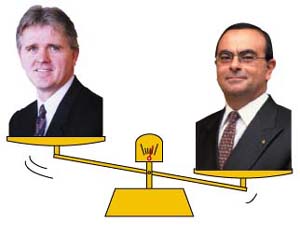Cost-Cutter or Profit-Maker? Japan Telecom's Morrow Chooses the Latter
Back to Contents of Issue: July 2002
|
by Sumie Kawakami |
|
 BILL MORROW HASN'T HAD THE publicity that Nissan president Carlos Ghosn enjoys but the Japan Telecom president is steadily taking strides toward slimming down Japan's third-largest phone company. Vodafone owns 66.7 percent of Japan Telecom, and rumors about the company are starting to swirl through the Japanese press just as they did when Ghosn took over Nissan. BILL MORROW HASN'T HAD THE publicity that Nissan president Carlos Ghosn enjoys but the Japan Telecom president is steadily taking strides toward slimming down Japan's third-largest phone company. Vodafone owns 66.7 percent of Japan Telecom, and rumors about the company are starting to swirl through the Japanese press just as they did when Ghosn took over Nissan.The most recent buzz is that Japan Telecom is planning to sell its fixed line business to Tokyo Electric Power Co. (Tepco) and its consumer Internet business to Sony. As we went to press, Japan Telecom was still denying the reports in the daily papers, although the company concedes that it is considering various possibilities to centralize its businesses. According to the Japanese media, the phone company in late May announced that it will sell its asymmetrical digital subscriber line facilities to ADSL operator eAccess. Japan Telecom already acquired a stake of about 15 percent in eAccess last summer. Details aside, it's no secret that Japan Telecom will be focusing most of its energy on its mobile phone unit, J-Phone. A Japan Telecom spokesman told J@pan Inc that the company is trying to revise its operations in general and nothing concrete has been decided. When Morrow became president last December, he described himself as a "profit-maker," as opposed to the nickname given to Ghosn -- "Le Cost-Cutter." Morrow's first action as president was "to make the rounds of clients and government officials accompanied by his predecessor, to exchange greetings and business cards" and to email his employees to assure them that their anxiety would soon turn to confidence and enthusiasm, according to the Asahi Shimbun, Japan's leading daily newspaper. In other words, Morrow acted very much like a typical old-school shacho. Morrow may be under great pressure to improve Japan Telecom's performance, as the Japanese group is now consolidated in the UK-based Vodafone's financial results. Despite its success with mobile unit J-Phone, Japan Telecom posted mid-term losses last September for the first time. That's what prompted Morrow to come up with a revival plan called Project V. Its main themes are to reorient staff "toward performance, results and customer-focused activities." Rather than introducing a package plan from top-down, Morrow organized a team of middle managers to set goals and strategies and sent email questionnaires to every employee. He also reshuffled the company's management team and lowered its financial forecast for fiscal 2001 to re-evaluate the carry value of its investments and to write off debts. Focus and profitability are the main themes of Morrow's Project V. After all, Japan Telecom was relying on J-Phone for over 83 percent of its profits as of last September. Morrow has said that corporate services are the key to success and that the company will expand its corporate data services. Another sign of change: Japan Telecom under Morrow has scrapped advertisements with model Norika Fujiwara that helped make J-Phone a smash with the teen crowd and opted for a more family-oriented campaign. Morrow is moving the company toward a Western way of increasing profitability while incorporating some Japanese ways, says Takashi Hayasaka, a telecom analyst at HSBC in Japan. "Morrow enjoys a relatively good reputation among Japanese staff as he seems to value the art of consensus building." -- By Sumie Kawakami (From the J@pan Inc newsletter, a free email newsletter published every Wednesday. Subscribe to our free email newsletters at www.japaninc.com /subscribe_news.html) |
|
Note: The function "email this page" is currently not supported for this page.





